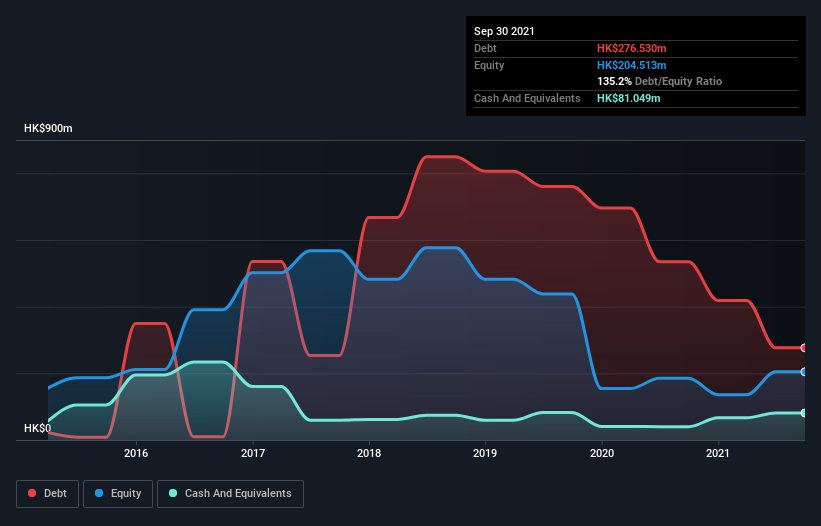
Some say volatility, rather than debt, is the best way to think about risk as an investor, but Warren Buffett famously said that 'Volatility is far from synonymous with risk.' When we think about how risky a company is, we always like to look at its use of debt, since debt overload can lead to ruin. Importantly, New Concepts Holdings Limited (HKG:2221) does carry debt. But the real question is whether this debt is making the company risky.
What Risk Does Debt Bring?
Debt assists a business until the business has trouble paying it off, either with new capital or with free cash flow. Part and parcel of capitalism is the process of 'creative destruction' where failed businesses are mercilessly liquidated by their bankers. However, a more common (but still painful) scenario is that it has to raise new equity capital at a low price, thus permanently diluting shareholders. Of course, debt can be an important tool in businesses, particularly capital heavy businesses. The first step when considering a company's debt levels is to consider its cash and debt together.
Check out our latest analysis for New Concepts Holdings
What Is New Concepts Holdings's Net Debt?
As you can see below, New Concepts Holdings had HK$276.5m of debt at September 2021, down from HK$534.7m a year prior. However, because it has a cash reserve of HK$81.0m, its net debt is less, at about HK$195.5m.

A Look At New Concepts Holdings' Liabilities
Zooming in on the latest balance sheet data, we can see that New Concepts Holdings had liabilities of HK$304.4m due within 12 months and liabilities of HK$196.7m due beyond that. On the other hand, it had cash of HK$81.0m and HK$141.3m worth of receivables due within a year. So it has liabilities totalling HK$278.8m more than its cash and near-term receivables, combined.
While this might seem like a lot, it is not so bad since New Concepts Holdings has a market capitalization of HK$467.5m, and so it could probably strengthen its balance sheet by raising capital if it needed to. But it's clear that we should definitely closely examine whether it can manage its debt without dilution. The balance sheet is clearly the area to focus on when you are analysing debt. But you can't view debt in total isolation; since New Concepts Holdings will need earnings to service that debt. So when considering debt, it's definitely worth looking at the earnings trend. Click here for an interactive snapshot.
Over 12 months, New Concepts Holdings made a loss at the EBIT level, and saw its revenue drop to HK$560m, which is a fall of 6.8%. That's not what we would hope to see.
Caveat Emptor
Importantly, New Concepts Holdings had an earnings before interest and tax (EBIT) loss over the last year. Its EBIT loss was a whopping HK$85m. Considering that alongside the liabilities mentioned above does not give us much confidence that company should be using so much debt. Quite frankly we think the balance sheet is far from match-fit, although it could be improved with time. Another cause for caution is that is bled HK$34m in negative free cash flow over the last twelve months. So suffice it to say we consider the stock very risky. There's no doubt that we learn most about debt from the balance sheet. But ultimately, every company can contain risks that exist outside of the balance sheet. To that end, you should learn about the 4 warning signs we've spotted with New Concepts Holdings (including 1 which is significant) .
If you're interested in investing in businesses that can grow profits without the burden of debt, then check out this free list of growing businesses that have net cash on the balance sheet.
Valuation is complex, but we're here to simplify it.
Discover if New Concepts Holdings might be undervalued or overvalued with our detailed analysis, featuring fair value estimates, potential risks, dividends, insider trades, and its financial condition.
Access Free AnalysisHave feedback on this article? Concerned about the content? Get in touch with us directly. Alternatively, email editorial-team (at) simplywallst.com.
This article by Simply Wall St is general in nature. We provide commentary based on historical data and analyst forecasts only using an unbiased methodology and our articles are not intended to be financial advice. It does not constitute a recommendation to buy or sell any stock, and does not take account of your objectives, or your financial situation. We aim to bring you long-term focused analysis driven by fundamental data. Note that our analysis may not factor in the latest price-sensitive company announcements or qualitative material. Simply Wall St has no position in any stocks mentioned.
About SEHK:2221
New Concepts Holdings
An investment holding company, engages in the construction and environmental protection business in Hong Kong and Mainland China.
Mediocre balance sheet and slightly overvalued.


